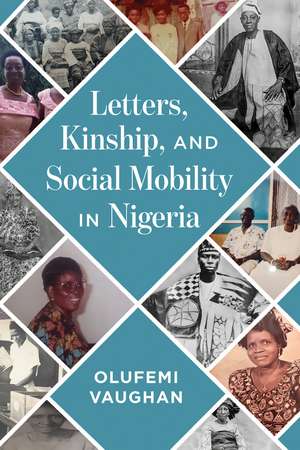Letters, Kinship, and Social Mobility in Nigeria: Africa and the Diaspora: History, Politics, Culture
Autor Olufemi Vaughanen Limba Engleză Hardback – 15 aug 2023
Letter writing was a dominant form of communication for Western-educated elites in colonial Africa, especially in Nigeria. Exposure to the modern world and a growing sense of nationalism were among the factors that led people to begin exchanging letters, particularly in their interactions with British colonial authorities. Through careful textual analysis and broad contextualization, Vaughan reconstructs dominant storylines, including themes such as kinship, social mobility, Western education, modernity, and elite consolidation in colonial and post-colonial Nigeria. Vaughan brings his prodigious skills as an interdisciplinary scholar to bear on this wealth of information, bringing to life a portrait, at once intimate and expansive, of a community during a transformative period in African history.
Din seria Africa and the Diaspora: History, Politics, Culture
-
 Preț: 164.51 lei
Preț: 164.51 lei -
 Preț: 165.36 lei
Preț: 165.36 lei -
 Preț: 507.02 lei
Preț: 507.02 lei -
 Preț: 216.96 lei
Preț: 216.96 lei -
 Preț: 258.96 lei
Preț: 258.96 lei -
 Preț: 172.75 lei
Preț: 172.75 lei -
 Preț: 241.30 lei
Preț: 241.30 lei -
 Preț: 235.42 lei
Preț: 235.42 lei -
 Preț: 319.98 lei
Preț: 319.98 lei -
 Preț: 427.26 lei
Preț: 427.26 lei -
 Preț: 240.43 lei
Preț: 240.43 lei - 15%
 Preț: 476.97 lei
Preț: 476.97 lei -
 Preț: 149.90 lei
Preț: 149.90 lei - 23%
 Preț: 476.07 lei
Preț: 476.07 lei -
 Preț: 505.08 lei
Preț: 505.08 lei -
 Preț: 539.68 lei
Preț: 539.68 lei -
 Preț: 205.29 lei
Preț: 205.29 lei -
 Preț: 265.45 lei
Preț: 265.45 lei - 23%
 Preț: 534.68 lei
Preț: 534.68 lei - 23%
 Preț: 475.06 lei
Preț: 475.06 lei - 23%
 Preț: 471.92 lei
Preț: 471.92 lei - 23%
 Preț: 471.33 lei
Preț: 471.33 lei - 21%
 Preț: 343.29 lei
Preț: 343.29 lei - 19%
 Preț: 440.08 lei
Preț: 440.08 lei - 8%
 Preț: 529.24 lei
Preț: 529.24 lei
Preț: 475.06 lei
Preț vechi: 616.96 lei
-23% Nou
Puncte Express: 713
Preț estimativ în valută:
90.91€ • 97.21$ • 75.79£
90.91€ • 97.21$ • 75.79£
Carte tipărită la comandă
Livrare economică 17 aprilie-01 mai
Preluare comenzi: 021 569.72.76
Specificații
ISBN-13: 9780299344504
ISBN-10: 0299344509
Pagini: 282
Dimensiuni: 152 x 229 x 23 mm
Greutate: 0.51 kg
Ediția:First Edition
Editura: University of Wisconsin Press
Colecția University of Wisconsin Press
Seria Africa and the Diaspora: History, Politics, Culture
ISBN-10: 0299344509
Pagini: 282
Dimensiuni: 152 x 229 x 23 mm
Greutate: 0.51 kg
Ediția:First Edition
Editura: University of Wisconsin Press
Colecția University of Wisconsin Press
Seria Africa and the Diaspora: History, Politics, Culture
Recenzii
“Reading this was a joy. It is precisely the kind of book that will command attention not only among Africanists but in adjunct and cross-fertilizing disciplines and cultural contexts where tensions and contestations around kinship, filiation, and familism—moral and otherwise—persevere, giving modernist claims of isolated individuality a run for their affective money.”—Ebenezer Obadare, author of Humor, Silence, and Civil Society in Nigeria
“By synthesizing a vast number of letters, Olufemi Vaughan reconstructs the trajectory of a class of Nigerians who were part of the colonial bureaucracy and sociopolitical system but were conscious of their filial responsibility not to allow the ties that bound them to break. . . . Innovative in its content and easily relatable for anyone interested in the development of modern literacy in Africa.”—Toyin Falola, author of A Mouth Sweeter thanSalt: An African Memoir
“[An] illuminating historical text. . . . The letters indeed offer an empirical window onto class relations, British colonial social engineering, assimilation, eminent domain, coloniality, Indigenous filial responsibilities and expectations, and the deployment of new forms of education-based discrimination within a changing society.”—CHOICE Reviews
“A remarkable trove of letters; a true family archive of 3,000 missives written between 1926 and 1994. Vaughan uses these letters to examine themes of modernity, elite self-fashioning, and enduring kinship obligations during the period when Nigeria was transitioning from British colonial rule to independence.”—International Journal of African Historical Studies
“By synthesizing a vast number of letters, Olufemi Vaughan reconstructs the trajectory of a class of Nigerians who were part of the colonial bureaucracy and sociopolitical system but were conscious of their filial responsibility not to allow the ties that bound them to break. . . . Innovative in its content and easily relatable for anyone interested in the development of modern literacy in Africa.”—Toyin Falola, author of A Mouth Sweeter thanSalt: An African Memoir
“[An] illuminating historical text. . . . The letters indeed offer an empirical window onto class relations, British colonial social engineering, assimilation, eminent domain, coloniality, Indigenous filial responsibilities and expectations, and the deployment of new forms of education-based discrimination within a changing society.”—CHOICE Reviews
“A remarkable trove of letters; a true family archive of 3,000 missives written between 1926 and 1994. Vaughan uses these letters to examine themes of modernity, elite self-fashioning, and enduring kinship obligations during the period when Nigeria was transitioning from British colonial rule to independence.”—International Journal of African Historical Studies
Notă biografică
Olufemi Vaughan, the Alfred Sargent Lee ’41 and Mary Farley Ames Lee Professor and Chair of Black Studies at Amherst College, is the author of Religion and the Making of Nigeria, among other works.
Cuprins
Contents
List of Illustrations
Foreword by Adesoji Adelaja
Acknowledgments
Introduction
1 The Brothers’ Letters
2 The Matriarchs’ Letters
3 Ibadan CMS Men: Kinship and Yoruba Civic Public
4 The Gladys Aduke Vaughan Files
5 From Freetown with Love
Conclusion
Notes
Bibliography
Index
List of Illustrations
Foreword by Adesoji Adelaja
Acknowledgments
Introduction
1 The Brothers’ Letters
2 The Matriarchs’ Letters
3 Ibadan CMS Men: Kinship and Yoruba Civic Public
4 The Gladys Aduke Vaughan Files
5 From Freetown with Love
Conclusion
Notes
Bibliography
Index
